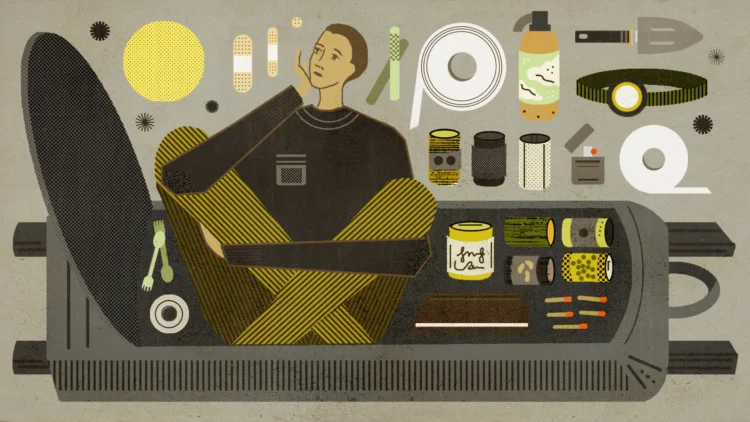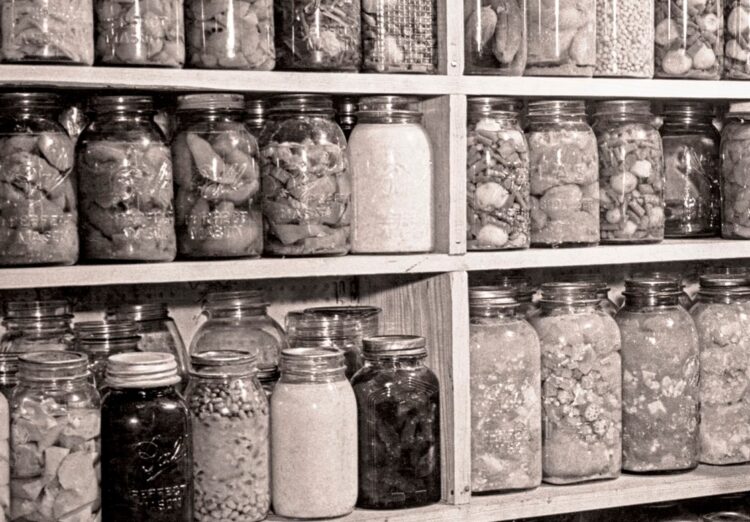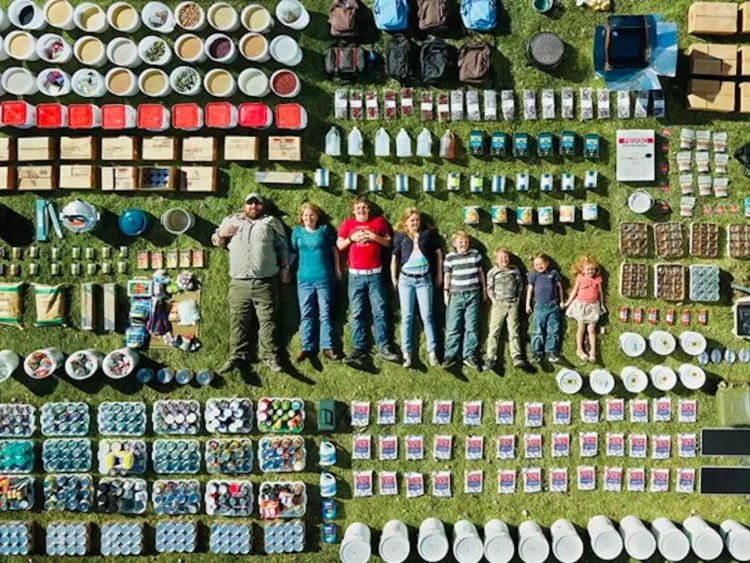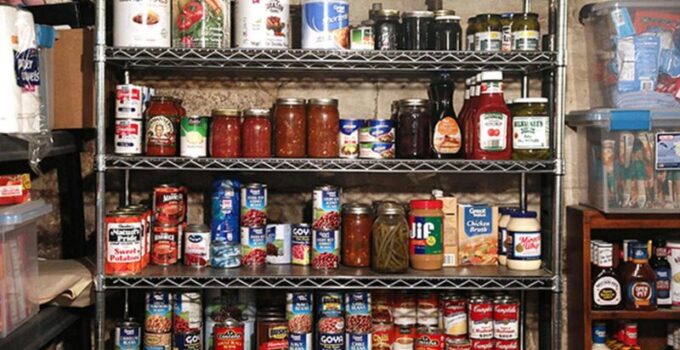If you are new to doomsday prepping, it is extremely important to understand the basics of prepping and to master these basics. There are a variety of things that can go wrong in this world that will require us to use our survival skills to live, such as a nuclear attack, grid failure, or government takeover.
In order to have a chance at surviving and protecting your family from harm, it is vital to learn how to prep for an emergency and how to put your survival skills to good use.
Page Contents
What is Prepping?

Source: npr.org
Prepping is preparing for everything that is necessary for survival if something bad were to happen. Everything from family safety, having enough food, storing plenty of water, having home security, having your finances sorted out, being stocked up with self defense weapons, to having an alternative solution for power are all the major things you will need to prep for survival.
Prepping is your back up plan if something terrible was to happen. It is your plan to keep your family safe that you are completely in charge of. Nobody else is responsible for prepping except for you and only you will be responsible for keeping yourself and your family alive.
What are you Preparing For?
You are prepping for pretty much anything you can think of. You are prepping for a variety of things, such as power grid failure, a nuclear attack, EMP (electromagnetic pulse attack), government takeover, supply chain failure, wilderness survival, and any other situation that would require you to be solely responsible for your and our family’s life.
Factors to Consider When Prepping
Keep in mind where you live and what the weather is typically like. Do you get a lot of snow or rain? Does it get really hot? If you experience extreme weather in your area like tornados, hurricanes, floods, earthquakes, or snow storms, you need to be prepared for the worst scenario.
What would happen if the power went out during one of these kinds of storms? You will need to have a way to cook and stay warm, so alternative methods of energy are necessary. If the power grid collapsed, would you have a way to pay for things without using a card? Debit and credit cards are so heavily relied on, but if something happened with the grid, we would need to have cash on hand. If there was an EMP attack, all things requiring electricity would be destroyed.
Depending on what you are prepping for, you will want to prep accordingly. If you are prepping for a government takeover, you should pack extra guns and ammunition in case you need them to keep your family safe. If you are preparing for an EMP attack, you should keep more cash on hand and secure ways to survive without electricity. Keep in mind what you are prepping for and what you will need to have extras of in case you need it.
5 Essential Steps

Source: theatlantic.com
Having steps in place in case of an emergency is a must when it comes to protecting yourself and your family. Following these 5 steps will allow you to follow an effective strategy for prepping and will help keep you afloat.
1. Secure Drinking Water
As humans, we cannot live much more than three days without water. Over 60 percent of our bodies are made up of water, so it is extremely important to not run out. Every day, you should store up to two gallons of water per person in your household. That might sound like a lot of water, but in reality it isn’t. Keep in mind you will be using all of this water scarcely, for eating and drinking and for your hygiene.
2. Stockpile Food and Plan for When you Run Out

Source: gq.com
Storing non-perishable food items is essential for survival. Unfortunately, you will not be able to store fresh food because of the possibility of there being no electricity. Without electricity, you will not be able to keep your refrigerator running to keep your food fresh. Look for food with a long shelf life and food that can be eaten right out of a can and does not need to be heated up or cooked.
3. Have a Bug Out Plan
A bug out plan is a drill originated from the military that requires you to grab your bag and leave as soon as possible because of danger. When creating your bug out plan, keep in mind weather in your area and likelihood for natural disasters. You will want to have at least four destinations as a part of your bug out plan, one in the North, the South, the East, and the West. Have a specific destination planned out so there is no confusion when it comes time to move.
To plan your bug out plan efficiently, have a route planned out and know about how long it will take for you to reach your destination. Knowing how long you will be gone is essential for packing the supplies you need and knowing if you will need to forage for food while en route. Your bag shouldn’t be more than 25 percent of your body weight and should only include essentials you will need to survive.
Some examples of important things to pack include medication you need to live, a first aid kit, non-perishable food items, water filters, a pocket knife, a tarp, cash, maps, a sleeping bag, tinder, or anything else you can think of that is necessary to bring with you.
4. Train Your Family

Source: businessinsider.com
In order for your survival plan to run smoothly, it is important that you discuss the plan with your family. If you have young children, be sure they understand each step of your plan as well. Take your family on a practice run of your plan. Drive along your area and find a few different routes for a safe location. Try hiking with your bug out bags as well so you all know what you can carry and how fast you can carry it. Teach your family the importance of stocking up food and water for survival.
5. Learn Essential Skills
You should consider mastering these skills for survival just in case you need to put them to good use.
- Fire Starting – Fire is one of the most important tools for survival. Knowing how to start a fire and keep the fire going is a skill you will need to learn. Learn how to start a fire without the use of matches and lighters, like using cordage or tinder.
- Navigation Without GPS – GPS is relied on, probably too much, these days. You will need to know how to get from point A to point B without GPS in a survival situation. Lear how to use a compass if you don’t already and learn how to use the sun and star constellations to help you navigate.
- Water Purification – Most of the time, water is not clean unless it is purified first. Always purify your water before drinking it, even if it is clear, so you don’t get sick.
- First Aid – You will need to know first aid skills in a survival situation. First aid is moe than just cleaning up a cut and putting a bandage on it. You will also need to know CPR, the Heimlich Maneuver, how to clean out a wound, stop bleeding, and how to properly bandage the wound.
- Hunting and Fishing – Hunting and fishing for survival are a skill you need to learn. You will need to know how to trap what you are trying to catch and how to do so effectively. You will need to learn how to track your prey so you know where they are for when you need to trap them. Trapping, hunting, and fishing might be the only way you and your family will eat.
Final Thoughts
If you have never thought much about how to prep for an emergency, now is a good time to start taking it seriously. Prepping involves a lot of hard work and dedication, but it is not as difficult as you might think. You will master these survival skills overtime and because of your hard work, you and your family will have a chance at making it through a tough situation. Visit Persurvive.com for more information about prepping and self-sustainability





